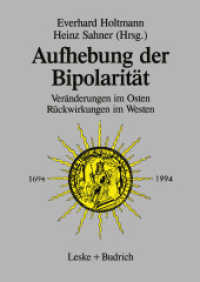基本説明
This book analyses the work of the ILO as a driving force in developing the status of indigenous peoples in international law.
Full Description
Indigenous Peoples, Postcolonialism, and International Law: The ILO Regime (1919-1989) explores the historical process leading to the emergence of indigenous peoples as distinct objects of modern international law, through the activity of the International Labour Organization (ILO). The ILO is the institutional site for the two current legally binding international instruments dealing with indigenous peoples, Convention No. 107 (1957), and Convention No. 169 (1989).
Based on careful research on official documentation and unpublished archival evidence, the book enquires into the origins of the ILO's historical interest in the living and working conditions of indigenous peoples, and traces this back to the organization's early concern on the conditions of life of 'native workers' in colonial territories in the inter-war period. The book connects this early concern with the organization's regional policy in the Americas, where the 'Indian problem' became a priority on the organisation's agenda. These historical processes set the ground for the adoption, a few years later, of Convention No. 107 and Recommendation No. 104, instruments that translate the main assumptions of state development policies towards indigenous groups into international law.
After an examination of the origins and content of Convention No. 107, the book sheds light on the process that lead the I.L.O. to reshape its old policies into the form of Convention No. 169, the most up to date and important international treaty dealing with the rights of indigenous peoples today.
Contents
I HISTORICAL ORIGINS; II THE LANGUAGE OF INTEGRATION; III THE FALL OF INTEGRATION








